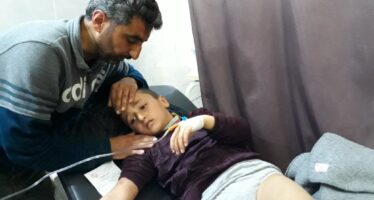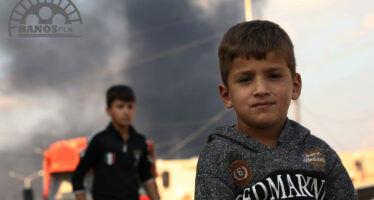Democratic autonomy offers draconian, Marxist-style rules for Kurds
![]()
AY?E KARABAT
ANKARA

The Democratic Society Congress presented the first comprehensive draft of its “Democratic Autonomous Kurdistan Model” at a conference in Diyarbak?r last Sunday.
While last week’s debate on autonomy and bilingualism for the predominantly Kurdish region of Turkey was fixated on official flag and language issues, an in-depth look at the package of proposals unveiled by an influential Kurdish group reveals that Abdullah Öcalan, the mastermind behind the demands for autonomy, envisages a Marxist, state-imposed administration in the Kurdish region.
The Democratic Society Congress (DTK), which describes itself as a local organization of Kurds in eastern Turkey comprising intellectuals, representative from civil society organizations, pro-Kurdish politicians and some members of the Peace and Democracy Party (BDK), presented the first comprehensive draft of its “Democratic Autonomous Kurdistan Model” at a conference in Diyarbakir on Sunday. The declaration triggered nationwide debate with much focus on autonomy and bilingualism, hindering debate on other points in the declaration, which obviously irked Kurds first and foremost.
For example, one proposal defends a Marxist-style economy for the Kurdish autonomous region in which every business owner is also an employee of that establishment and is barred from maximizing profits. “The rights of use and consumption of economic resources should belong to a democratic autonomous Kurdistan,” the declaration said.
In another bizarre suggestion, the draft argued that women and youths in the Kurdish region have been prevented from pursuing what it called a “struggle” because of social and cultural activities in facilities built in the region by the state. “This situation has pushed them into drug abuse and prostitution,” the text claimed. According to the draft, cultural and artistic work should not be considered material open to trade but should be shared by people. The vague term of “democratic autonomy” was suggested to include a series of demands including a separate flag, self administration and even refer to having their own security force for purpose of “self defense,” (a term that the text introduces), for the mostly Kurdish-populated areas of Turkey.
But it also presented itself as an ultimate panacea for all sorts of other problems in the Middle East, which obviously included a method of ensuring unity between the Kurds of Syria, Iraq, Iran and Turkey.
It also suggested several top-to-bottom imposed regulations for society which includes altering the structure of the family; an economic model in which everybody will be self-employed and is not aimed at maximizing profits; an intensive cultural life but without the products of art being commercialized; and an organizational model that works its way up from the villages, where every small unit will have its own parliament, leading to the top, where the DTK will stand.
According to ?brahim Güçlü, a prominent Kurdish intellectual, this democratic autonomy is a provocation aimed not only at stirring up Turkey but also other countries.
“Turkish society in general has come to the point of freely discussing the Kurdish question. This is the first step to the solution. This process is progressing under its own momentum. It is very suspicious that in this atmosphere, just six months before general elections, apart from some reasonable suggestions such as a multilingual system, the addition of a model for the Middle East and extremely vague issues like self-defense units are not helpful to the solution. The art of provocation requires a mixing of some ideas that are acceptable with some nonsensical ideas,” he told Sunday’s Zaman.
The DTK opened the discussions last weekend in Diyarbak?r on the “democratic autonomy” on a vague idea based on the thoughts of Abdullah Öcalan, leader of the outlawed Kurdistan Workers’ Party (PKK) currently serving a life term in prison.
The declaration of democratic autonomy led to fierce discussions by the public and media and aroused reactions from the different political parties as well as the government. The prosecutor of the Supreme Court of Appeals opened an investigation into the meeting of the DTK and this process, which might go until the closure of the BDP if the prosecution finds any link between it and the BDP.
The text claims that the process of establishing democratic autonomy in Turkey will bring on the democratization of the Middle East. According to text, democratic autonomy will improve relations among the different ethnicities in Turkey at the same time with the other parts of “Kurdistan” and will establish democratic and free relations without questioning the borders of the states that the Kurds are living in.
“Democratic Autonomy will launch a new era in the relations between Kurds and the countries that they live in such as Iraq, Syria and Iran. When this big problem is solved, the other problems of the Middle East will be solved also. While the Kurdish question remains a source of tension and clashes, the region will continue to face political, social and economic instability,” the text claims but does not mention what the other problems of the Middle East are.
The text also stresses that the diplomacy aspects of democratic autonomy, especially with the other countries established in “Kurdistan,” will be very important in this respect and that this will serve the economic development of the region as well as the interests of the Kurdish diaspora.
A new social contract or new luxury cars?
The text in its preamble notes that democratic autonomy aims for the democratization of the Republic of Turkey and that this process should be done in the form of a “dialogue,” but at the same time it aims to institutionalize democracy. It claims that democratic autonomy aims to change the strict and narrow mind of the nation state which is a burden for Turkish society and prevents the development of the people economically, socially and culturally.
It also emphasizes that democratic autonomy will be a “new social contract” with the Turkish Republic without changing the borders but by ensuring fraternity within current borders.
“Our model is a democratization model which is applicable in other parts of Turkey. Nonetheless, the world has a tendency for self-management and decentralized political systems,” it argues.
Professor Mehmet Altan, who also participated in the DTK meetings, told Sunday’s Zaman that nation states are not human oriented and that they cede their authority to either supra-national bodies like the EU or to local administrations. However, he said that he has some concerns if this democratic autonomy aims to be human oriented or aims to create an administration with all the shortcomings of the nation state: “Will they pay attention to the human development index, or do they want luxury cars for themselves?” said Altan, questioning the real intention of democratic autonomy.
An organizational structure from bottom to top
The text describes the organizational model of democratic autonomy going from bottom to the top and suggests village, neighborhood, district and provincial parliaments on the basis of confederations. At the top of this organizational structure will be the DTK, which will send representatives to the Turkish Parliament. It is also mentioned that this structure and the laws of autonomy should be recognized by Turkish Republic and as well as the EU.
Regarding the contentious issue of “self defense,” which has prompted heated debate, the text stresses that self defense is vital not only against threats coming from outside but also from inner threats, especially against the moral values of society.
“Self defense is not only a concept of military defense, but it is also related to the protection of the identity, ensuring the politicization and democratization of society,” says the text, noting that self defense is considered a right by the United Nations and international conventions.
?ah ?smail Bedirhano?lu, the chairman of the Southeastern and Eastern Anatolia Businessmen’s Association (GÜNS?AD), told Sunday’s Zaman that the discourse of the text of the democratic autonomy is sharp and rigid and that it is not clear what the meaning of self-defense is. He believes this subject will create concerns in the general public opinion. “What is the meaning of this self-defense and against whom will it be used? This subject was discussed a lot during the meetings. It attracted much concern and criticism. We also told them that this subject can create concerns in Turkish public opinion in general,” he said.
From culture to self-employed economy
The text also discusses the cultural makeup of Kurdish society at length. It claims that Kurdish society is going through a process of assimilation because of limitations on the Kurdish language, and this process must be reversed by improving the cultural and artistic facilities in the community. According to the text, cultural and artistic works should not be considered something open to being bought and sold but instead should be shared by the people.
In terms of the social dimension of democratic autonomy, the text claims that young people and women have been pushed into prostitution and drug abuse and under the pretense of social and cultural activities have been distracted from the Kurdish cause. The text stresses the importance of youth and women and suggests that the structure of the family should be altered in a way that the hierarchy in the family should disappear.
The economic model of democratic autonomy, according to the text, will be based on principles of anti-monopoly and solidarity in which everybody will be a worker in his or her business but will not have an aim of maximizing profits. “The rights of use and consumption of economic resources should belong to a democratic autonomous Kurdistan,” the text says and adds that production should be carried out based on ecological principles.
Related Articles
“The Turkish Invaders’ Use of Chemical Weapons against Citizens”
![]()
The Turkish invasion of the Afrin region of Rojava has already resulted in many innocent civilian casualties.
Election Board decision: A coup against the Kurds and democracy
![]()
The decision to strip Hatip Dicle of his democratically given mandate amounts to nothing short than a coup The decision
Who are the terrorists
![]()
According to the plans and propaganda of Erdogan, the safe zone, 30 kilometers deep, he secured in north-east Syria with




